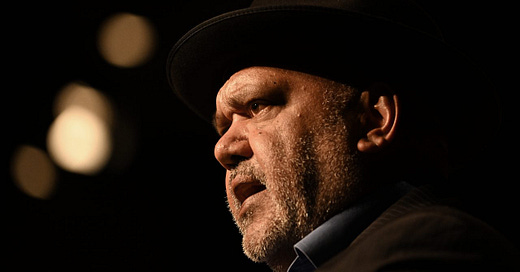If anyone’s in doubt come October 14, how they should vote, and are wavering towards, ‘No’, then comments, by Indigenous colossal Noel Pearson, should reaffirm why voting ‘No’ is possibly the right thing to do for Australia.
Pearson’s unapologetic claim Indigenous Australia won’t return to assimilation as part of the proposed ‘Voice to Parliament’ should concern everyone.
Many would think assimilation would form an essential part of the ‘Yes’ campaign’s legitimacy to allay fears Australia won’t be a divided nation, along with all the other hidden landmines yet to be exposed.
But not according to Pearson and his fellow elite Indigenous members.
Instead, he’s has done exactly what Australians are fearing – sowing division and laying the foundation of expectation Australia will become a two-state nation divided by hatred where reconciliation and unity are not objectives.
Pearson has ignited a heated debate with his criticism of the Shadow Minister of Indigenous Affairs, Jacinta Price, adding fuel to the ongoing discussion of reconciliation in the country.
Pearson’s been a key figure in the debate surrounding the ‘Voice to Parliament’.
But his comments insist Indigenous Australians won’t accept a return to assimilationist policies.
The move to reject assimilating means moving away from integration, and that should be a red flag for Australians.
Furthermore, he says any attempt to sideline Indigenous voices in policymaking, intentionally or unintentionally, would undermine the progress made towards recognising and respecting Indigenous cultures and perspectives.
But Pearson didn’t stop there, he also addressed various statements made by Jacinta Price.
Pearson attacked Price for her stance on Indigenous issues, accusing her of reinforcing divisive views within the nation.
But what a fascinating allegation to make by Pearson. Anyone would have thought not wanting to assimilate was a move to reject integration was divisive initself.
Price has consistently demonstrated she remains the sanest voice of all in the ‘Voice to Parliament’ debate, Pearson however, doesn’t.
He, however, continues to struggle to articulate a convincing message that would have you want to consider voting ‘Yes’.
Pearson’s outbursts of aggression and bullying suggest the ‘Voice to Parliament’ campaign is slipping away and his attacks on Price, a formidable voice and a thorn in the side of the ‘Yes’ vote, reinforces their desperation.
As two of the key faces of the ‘Voice to Parliament,’ Pearson and Marcia Langton are interesting characters – they’re trying to sell an initiative that has more hair on its back than legendary wrestler, Brut Bernard.
Not everyone wants to be seen on the right side of history, especially when their making of history could condemn Australia’s future forever.
If the referendum does succeed, Australia does not want to be characterised as a basket case.
The debate surrounding Indigenous rights and reconciliation in Australia is far from new. It is a complex, multifaceted issue that has been discussed for decades.
The changing policies toward Indigenous Australians has evolved since the initial impact of colonisation to self-determination and self-management.
Pearson highlight the ongoing division within Australia, where opinions on Indigenous matters often fall along political lines.
The struggle to find common ground has created a deeply polarised national debate.
Pearson's attack on Price is an overt attempt to bully or silence opposing voices, others argue that it is an expression of strong advocacy.
The 'Yes' campaign, advocating for Indigenous recognition and representation, has been a driving force behind the push for a ‘Voice to Parliament’.
Its supporters argue Indigenous voices must be heard in decision-making processes that affect their communities.
But just as Langton showed, the 'Yes' campaign may sometimes employ strong rhetoric to advance its objectives.
To understand the significance of Pearson's comments and the ensuing debate, it’s crucial to consider the broader context.
Indigenous Australians have long faced challenges related to social, economic, and political disparities.
The calls for recognition and a ‘Voice to Parliament’ are rooted in a desire to rectify historical injustices and empower Indigenous communities.
Pearson's comments have brought renewed attention to the ongoing debate over Indigenous rights and reconciliation in Australia.
Pearson’s relentless attack on Price underscores the stakes involved and the desperation of the ‘Yes’ campaign.
The path forward requires proper debate and a shared commitment to address historical injustices and empowering Indigenous voices without dividing Australia – and for Pearson and Langton to stop their abuse and attacks on Price and anyone else they see as fair game that opposes their position.
The ‘Voice to Parliament’ it seems isn’t a voice for recognition but more about division and a grab for Australia – suspicion of intention should mean Australians without clarity are left with no choice but to vote ‘No’ and Pearson has reaffirmed it.





The Yes campaign still refuses to give full information on how this affects our constitution, (Albanese's disgrace for dividing the nation) so, why are they withholding information that would assist their cause? ... because it wont. And anyone who questions how it will work, is called racist, booed, attacked and belittled. I sincerely hope that people will realize that voting for a "mob" that oppresses any other view, shows what the future of the Voice will be. Great article George. Thank you.